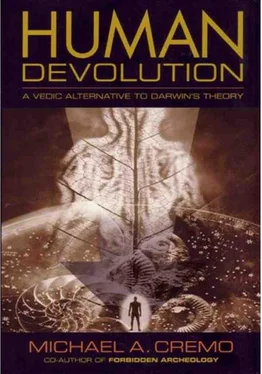Michael Cremo - Human Devolution - A Vedic Alternative To Darwin's Theory
Здесь есть возможность читать онлайн «Michael Cremo - Human Devolution - A Vedic Alternative To Darwin's Theory» весь текст электронной книги совершенно бесплатно (целиком полную версию без сокращений). В некоторых случаях можно слушать аудио, скачать через торрент в формате fb2 и присутствует краткое содержание. Год выпуска: 2003, ISBN: 2003, Издательство: Torchlight Publishing, Жанр: Старинная литература, на английском языке. Описание произведения, (предисловие) а так же отзывы посетителей доступны на портале библиотеки ЛибКат.
- Название:Human Devolution: A Vedic Alternative To Darwin's Theory
- Автор:
- Издательство:Torchlight Publishing
- Жанр:
- Год:2003
- ISBN:9780892133345
- Рейтинг книги:4 / 5. Голосов: 1
-
Избранное:Добавить в избранное
- Отзывы:
-
Ваша оценка:
- 80
- 1
- 2
- 3
- 4
- 5
Human Devolution: A Vedic Alternative To Darwin's Theory: краткое содержание, описание и аннотация
Предлагаем к чтению аннотацию, описание, краткое содержание или предисловие (зависит от того, что написал сам автор книги «Human Devolution: A Vedic Alternative To Darwin's Theory»). Если вы не нашли необходимую информацию о книге — напишите в комментариях, мы постараемся отыскать её.
Human Devolution: A Vedic Alternative To Darwin's Theory — читать онлайн бесплатно полную книгу (весь текст) целиком
Ниже представлен текст книги, разбитый по страницам. Система сохранения места последней прочитанной страницы, позволяет с удобством читать онлайн бесплатно книгу «Human Devolution: A Vedic Alternative To Darwin's Theory», без необходимости каждый раз заново искать на чём Вы остановились. Поставьте закладку, и сможете в любой момент перейти на страницу, на которой закончили чтение.
Интервал:
Закладка:
Aristotle, in the twelfth book of his metaphysics, said that the stars and planets acted as an intermediary between his spiritual Prime Mover and the world of matter, composed of four elements (earth, water, fire, and air). The movements of the celestial bodies were therefore the intermediate cause of terrestrial life and movement (Thorndike 1923, v.2, p. 253). Here we find a cosmology that depicts the universe as divided into three regions, resembling the Vedic cosmology.
Publius Cornellius Scipio Aemillanus (185–129 bc) was a member of a patrician Roman family. At a time when he was contemplating suicide, he saw his deceased father in a dream. In the course of warning him against suicide, his father instructed him on the nature of the soul. An account of this incident is given in Cicero’s on the Republic (IV, 14–26). The father of Publius, from his place in the spiritual world, said: “Unless God whose temple is the whole visible universe releases you from the prison of the body, you cannot gain entrance here. For men were given life for the purpose of cultivating that globe, called Earth, which you see at the center of this temple. Each has been given a soul, from these eternal fires, which you call stars and planets, which are globular and rotund and are animated by divine intelligence. . . . Like all god-fearing men, therefore, Publius, you must leave the soul in the custody of the body, and must not quit the life on Earth unless you are summoned by the one who gave it to you; otherwise you will be seen to shirk the duty assigned by God to man. . . . be sure that it is not you who are mortal, but only your body; nor is it you whom your outward form represents. Your spirit is your true self, not that bodily form that can be pointed out with the finger. Know yourself, therefore, to be a god—if indeed a god is a being that lives, feels, remembers, and foresees, that rules, governs, and moves the body over which it is set, just as the supreme God above us rules this world. And just as that eternal God moves the universe, which is partly mortal, so an eternal spirit moves the fragile body” (Eliade 1967, pp. 373–374).
The views expressed by the father of Publius about the soul of the individual body and the soul of the universe are quite close to those found in our template Vedic cosmology. A. C. Bhaktivedanta Swami Prabhupada says in his commentary on Bhagavad Gita (7.6): “This material body is developed because spirit is present within matter; a child grows gradually to boyhood and then to manhood because that superior energy, spirit soul, is present. Similarly, the entire cosmic manifestation of the gigantic universe is developed because of the presence of the Supersoul.
. . . The cause of the big universe is the big soul, or the Supersoul. And Krishna, the Supreme, is the cause of both the big and small souls.”
In his metamorphoses, Ovid (43 bc–18 ad) declared that in the beginning “nature was all alike, a shapelessness, chaos . . . in whose confusion discordant atoms warred.” But he also spoke of an original, singular god “who out of chaos brought order to the universe, and gave it division, subdivision.” Then came stars, the abodes of a plurality of gods, who seem to have been subordinate to the one who originally brought order out of chaos. Then “shining fish were given the waves for dwelling, and beasts the earth, and birds the moving air.” Finally humans appeared. Ovid suggested “man was born, it may be, in God’s image” (Sproul 1979, pp. 170–171). Here again we see an apparent tripartite division of the cosmos. The spiritual realm of the original singular god, the celestial realm of the subordinate gods (demigods), and the terrestrial realm of ordinary living beings, including humans.
The Greek philosopher Plutarch (c46–c120 ad) said in on the Soul that the journey of the soul at the time of death was like the experience of someone being initiated into mysteries, such as the Eleusinian mysteries. Plutarch wrote: “At first one wanders and wearily hurries to and fro, and journeys with suspicion through the dark as one uninitiated: then come all the terrors before the final initiation, shuddering, trembling, sweating, amazement: then one is struck with a marvelous light, one is received into pure regions and meadows, with voices and dances and the majesty of holy sounds and shapes: among these he who has fulfilled initiation wanders free, and released and bearing his crown joins in the divine communion, and consorts with pure and holy men, beholding those who live here uninitiated, an uncleansed horde. . . . huddled together in mud and fog, abiding in their miseries through fear of death and mistrust of the blessings there” (Eliade 1967, p. 302).
In the first century ad, Manilius composed an astrological treatise in which he compared the universe to a living creature permeated by a single spirit, which gives it form (Luck 1985, p. 332). Here we have further echoes of the Indian concept of God distributed in nature, and of the vishvamurti, or Universal Form, the universe conceived as the body of God. According to both Manilius and the sages of ancient India, God is the soul of the universe, giving it life. It is this unifiying presence of God’s spirit in nature, said Manilius, that establishes a connection between human destiny and the stars (Luck 1985, p. 333). Furthermore, he says that this God “brings down from the heavenly stars the creatures of the earth” (Luck 1985, p. 333). I find this view quite compatible with my own, which also involves a descent of humans and other living things from higher planes of existence.
Around 217 ad, Philostratus composed the life of apollonius, recording the travels and teachings of the Pythagorean philosopher Apollonius of Tyana. Scholars agree that Apollonius was a genuine historical figure, but they disagree as to how well Philostratus’s account reflects the actual life of Apollonius. In any case, the cosmological and metaphysical content of the the life is of most interest to me, and whether it derives from Apollonius or Philostratus does not make much difference for my purposes. The citations I give from Philostratus are from the translation by Conybeare.
As a Westerner who has journeyed to India and taken up the practice of an Indian philosophical and religious system, I find it interesting that Apollonius, according to Philostratus, traveled to India, where he encountered brahmanas with mystic powers. These brahmanas could mys-teriously sense that Apollonius was coming, and sent a messenger to greet him by name while he was still far away from their dwelling place. The chief of the brahmanas, Iarchus, knew that Apollonius was carrying a letter for him, and correctly identified a particular misspelling in the unseen document (Philostratus III, 12, 16). Iarchus also displayed knowledge of many things that had happened to Apollonius during his life. According to the account, the brahmanas could make themselves invisible whenever they chose and could also levitate (III, 13, 17).
When the local king came to visit the brahmanas, Apollonius noted that vessels bearing food and wine appeared mysteriously from out of nowhere (III, 27). Iarchus and Apollonius also spoke of reincarnation (III, 19). In the course of this discussion, each gave details of his own previous existence. On being questioned by Apollonius, Iarchus claimed to be a reincarnation of an Indian warrior much like the Greek hero Achilles (III, 19), while Apollonius, on being questioned by Iarchus, revealed he had been in a previous life the pilot of an Egyptian seafaring boat (III, 23).
Apollonius asked Iarchus and his Indian companions about the composition of the universe. They said it was composed of elements. “Are there four?” asked Apollonius, referring to the earth, water, fire, and air of Greek cosmology. Iarchus replied that there were five: “There is the ether, which we must regard as the stuff of which gods are made; for just as all mortal creatures inhale the air, so do immortal and divine natures inhale the ether” (III, 34). Lists of the five elements mentioned by Iarchus, including ether, are found in Bhagavad Gita and other Vedic texts. Responding to questions by Apollonius, Iarchus said that the universe is to be seen as a living creature, with a soul. This soul adjusts the conditions of the universe to the actions of the creatures inhabiting it. “For example,” said Iarchus, “the sufferings so often caused by drought are visited on us in accordance with the soul of the universe, whenever justice has fallen into disrepute and is disowned by men” (III, 34). Here we find an account of the laws of karma , which are administered by God in His form of Supersoul, the witness present in the hearts of all and even within the atom.
Читать дальшеИнтервал:
Закладка:
Похожие книги на «Human Devolution: A Vedic Alternative To Darwin's Theory»
Представляем Вашему вниманию похожие книги на «Human Devolution: A Vedic Alternative To Darwin's Theory» списком для выбора. Мы отобрали схожую по названию и смыслу литературу в надежде предоставить читателям больше вариантов отыскать новые, интересные, ещё непрочитанные произведения.
Обсуждение, отзывы о книге «Human Devolution: A Vedic Alternative To Darwin's Theory» и просто собственные мнения читателей. Оставьте ваши комментарии, напишите, что Вы думаете о произведении, его смысле или главных героях. Укажите что конкретно понравилось, а что нет, и почему Вы так считаете.












